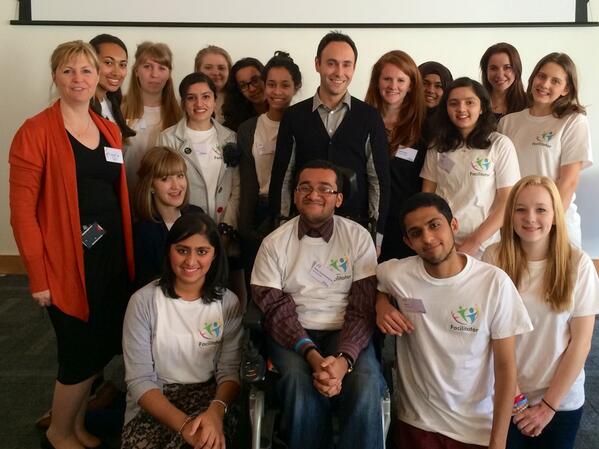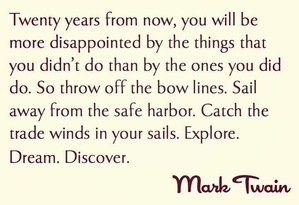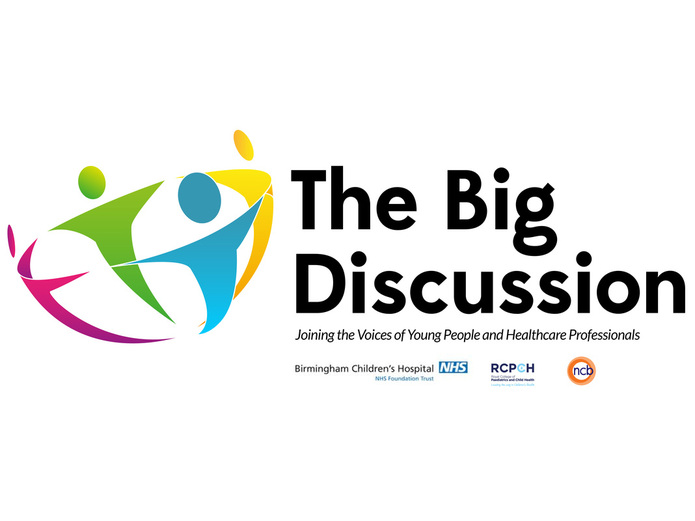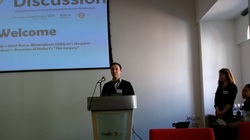 After a year in the planning and organising by the children and young people of the Birmingham Children Hospital (BCH) Young People Advisory Panel, Royal College of Paediatrics and Child Health Youth Advisory Panel and National Children's Bureau and the fantastic team of professionals from the three organisations on the 16/04/2014 we hosted 'The Big Discussion'. The Big Discussion started as an idea by Ellie Miler who is a member of the RCPCH YAP and was on the board as a governor for BCH. Her friend and her came up with an idea for a youth led event which bought together the movers and shakers within healthcare and children and young people to talk and to truly discuss what matters to young people. That fantastic seed which Ellie planted but was unable to see through flourished into The Big Discussion. This event was meant to have children and young people at the heart and it truly did, as one of the many tweets we got about the day, one healthcare professional commented that it was refreshing to see healthcare professionals being equalled, if not outnumbered by young people. One each of the tables there was at least one young facilitators and other young people who came as guests. The day was professionally recorded and captured by representatives from The Reporters Academy (@TRAcademy), which is a media production company run by young people, which is very in-keeping with the themes of the day (Very much looking to see the finished product soon). The day was structured as a combination of key note speeches as well as four discussion topics, we as the young people came up with and felt were the most important areas in our healthcare that needed discussing. We were lucky and honoured to have Aled Jones, from BBC Radio 1 hosting and facilitating the day alongside the youth chairs (one from each of the key organisations). The day started off with a welcome from Michelle McLoughlin (Chief Nurse, BCH). She kicked the day off introducing all the key note speakers who would be sharing their insights and be speaking throughout the course of the day. She then handed over to Aled Jones, who took over proceedings with an fantastic flair and energy which lasted all day. He was able to keep the audience entertained, while keeping to time amazingly. Keynote from Kath Evans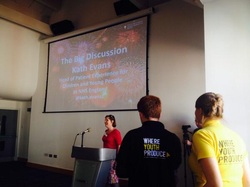 After the ice breaker which Aled hosted, he handed over to the magnificent Kath Evans. Kath is the Head of Patient Experience at NHS England. We as the RCPCH YAP have a lot of love for Kath, she is such a strong and positively passionate advocate for children and young people's involvement in their own healthcare and their rights to be heard. Her presentations are always amazing and this one wasn't any different. Kath started off by reminding us once again why the voices of children and young people are important when it comes to making changes and in improving our health service. "Children and Young People are 22% of the population. 28-30% of all A&E and approx 40% of all primary care activity relates to Children and Young People - yet there's not the focus on improving" With such significant numbers, our voices is not one that should or can be ignored. Kath also promoted for "Health care with and for them (Children and young people) that's needed if we are to change the future of health and the NHS. Young People have great ideas they want more health info in schools, they want health professionals to communicate more effectively with them. Generally things young people want don't cost more money but we do need attitudes of health care professionals to shift and 'get' the importance of focusing on young people." She rounded off her speech with the starfish story, which can be found here. It is a really appropriate story which I will take with me forever. Anyone can make change, no matter how small your actions they have an effect and your small action can have impact on others an encourage them to make a small change too. That in a sense symbolised what this whole event was about. We as young people came together to play our part in trying to change our health care, our small actions we hope will encourage and motivate those in attendance to go out and make their own little change. In the end together all our little changes will add up to a positive and big change to our healthcare. Discussion 1: Communication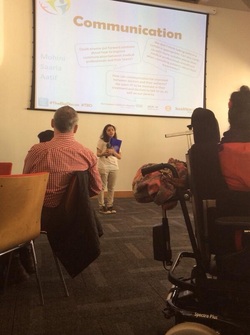 After Kath, we moved onto our first session of the day. The first session was on communication. Good and effective communication is the basis of all the discussions we were to have throughout the day. Communication between children and young people and their healthcare professionals are vital and we wanted to reiterate it's importance and just how crucial good communication was. To ensure the communication and discussion during this session was effective, one of the youth chairs requested everyone place their electronic gadgets and phones in the centre of the table so they could concentrate on effective face - to - face communication. One of the stand out parts of the introduction was a role play acted out by one of the youth chairs and the young facilitators. The role play consisted of the youth chair standing behind a curtain to illustrate how confidential conversations behind curtains on a ward isn't. “Curtains are not sound barriers” , it doesn't respect the privacy and confidentiality of the patients and we as young people don't really like other people hearing about our personal health issues and things. After the wonderful introduction and presentation we moved onto the discussion part where we got to discuss the three main questions which the communication group came up with, which were:
After the discussions, the floor was opened so the representatives present were able to share their key insights from their own table discussions. The main conversations revolved around the topic of how to maintain confidentiality and privacy. The first discussion surrounded the illegibility of the writings of doctors and nurses, to this end the solution recommended by the floor was the use of tablets and other electronic devices in order to record the notes and then they would be printed out and placed on file. This for one, heightens confidentiality as the notes are being written up on a tablet and therefore is under password lock. The point of using tablets during ward rounds was also addressed in a session at the RCPCH Annual Conference which I attended last week, which spoke about how the use of electronic devices such as tablets can increase efficiency, as well as speeding up ward rounds. The second point, was referring back to the curtains role play, in order to upkeep confidentiality and privacy one of the suggestions was the use of two ward rounds and actually asking the young person if they were comfortable talking about their treatment on the ward or if they prefer to discuss it in private. If the young person wants to be spoken to in private then that should be something that is accommodated for and the doctors come back on themselves and take the young person to a private room to discuss their health and treatment. This would be backed up by the fact, that we believe it won't just be one person who would want to discuss their health and personal matters in private. The third point of discussion was whether or not children and young people were aware of their rights while in hospital. Many present at the event were not aware of the UN Rights of the Child article which discussed the basic rights children and young people are entitled to. The feeling was that if young people knew what their rights were than they would not feel as scared to ask to be spoken to in a private environment. To this end, the use of phone applications with the rights of the child outlined in an age appropriate fashion was needed. This would ensure that as many children and young people are reached as possible. Then the usage of PHSCE lessons in order to make children and young people aware of these apps and how to get the help and support they need as well within the health service. One of the last things which was discussed in this session was on the topic of whether doctors had appropriate training in communication when it comes to talking to children and young people. There has been consensus among the RCPCH YAP that some doctors definitely need some for of communication training, especially the ones who qualified before the last decade, as the newer doctors becoming qualified are having communication training embedded into their time at medical school. We felt that communication that made us feel involved in our treatment was important because at the end of the day "it is our bodies that are being affected, our lives that are being changed and our futures that decided". Combined with communication we felt that their personality mattered as well, as one of the young people highlighted “Just smile at us”, we want to be made feel comfortable. Having been admitted into hospital, some people may be apprehensive and scared and a genuine smile and kind and reassuring communication can go a long way. This feeling can be simplified in this acronym for SMILE which I found on the twitterverse while discussions were being had: S Say hello to the person M Make the person feel at ease I Introduce yourself to the person L Look at the person and listen to what they are saying E Explain what you will be doing for the young person in a clear way Discussion 2: Health Education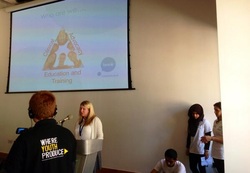 The second session of the day was regarding health education to illustrate this point we invited the organisation Brook to champion the need for sex and relation education in schools and for young people in general. they proposed several ways of doing this; through the use of PHSCE (Physical Health Social Citizenship Education) lessons in schools and the use of school nurses in schools. They also addressed the need for a holistic approach in relation to sex education in schools, including addressing gay sexual health and relations. Key Questions;
Again I will pick some of the key discussed points that came out from the table discussions. The first and most important discussion was around the best way to access young people to provide health education. The questions was would it be through the school nurse, walk in centres or social media or other means? At the moment PHSCE lessons are not, at least in my experience, not the most engaging lessons in the curriculum. They were the least attended sessions at my College, and the one were the topics discussed were taken with the least amount of seriousness. This was especially, as most of our PHSCE lessons consisted of videos made in the 1990s and these lessons were delivered by our subject teachers. Therefore, opening up to them was one of the last things we wanted to do. This would be were the involvement of the school nurse would come in, as they would be an impartial individual to take these lessons and would be in a more suitable place to advice and signpost young people. If school nurses or external speakers were to come into colleges more, I think that would engage the students more and get them learning and listening more. The most engaging of my PHSCE lessons were in my later years, in year 10/11, when we had the choice of sessions we could attend and they were all delivered by outside speakers who were able to delivered personal and emotive stories with advice which we took more seriously and were the ones that touched us and made us think the most. Another point raised by one of the young people was the need for separate gender, classes for sex and health education. Sometimes classes for these sessions, depending on the school, are mixed. The feeling behind this was while in certain situations it can be useful, i.e.. when try to illustrate and teach about the basic relationship between the genders, it is more beneficial to have separate classes, as young people feel they are able to open up more to peers of their own gender. This would prompt discussion and therefore get young people more interested in learning about things that effect their and others health and wellbeing. Along with this, there was a strong call from everyone present for peer sex and health education to be made compulsory in all schools in the country. The life skills and health and sex matters discussed in PHSCE sessions are very important and it is important to learn about things beyond the basic curriculum. It is unfair to deprive some students of this. We are all entitled to a equal and fair education, and sex and health education plays a big part in this. There needs to be some standard set as to what needs to be covered in these sessions, I think, and I think there needs to be a multitude of agreed resources published online on PHSCE website so all schools have access to the basic tools and resources when it comes to covering these topics. One of the final things that was raised and I would like to pick up on is around having guidelines and and defining roles of school nurses. We all understood how important school nurses could be if utilised efficiently and properly. In some schools, such as mine, we didn't have a school nurse we had a registered first aider. Therefore, they wouldn't be equipped to deal with the same things a school nurse would be able to deal with. This raised the question, what are they having to deal with? Among treating the young people in school who have minor injuries and immunisations, do they also have the role of safeguarding the wellbeing of the pupils of the school? I think the general consensus of the day was that they should and as such there should be more school nurses to assist with the role of safeguarding. I think in schools were there isn't a school nurse or where the school nurse has to work over several schools/ sites, there should be a designated full time nurse. However, having a full time school nurse isn't enough, the pupils of the school need to be made aware of who their school nurse is and they need to have access to information about how, when and where to access them. One of the young people at the event commented that they only saw and heard about the drop in sessions for the school nurse in the very first assembly in their first year. This is not acceptable, the students need to be kept updated when their school nurse is available for drop in sessions, and also in the school diaries students should have information about how to access their school nurses as well which is updated every year. Discussion 3: Transition and Sign Posting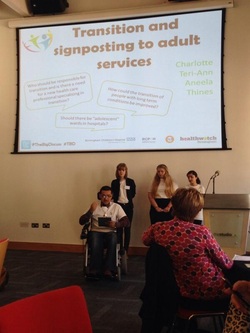 After a delicious lunch came the session I had the pleasure of presenting with my group on transition and signposting to adult services. All of us shared our own personal experiences of transition, as each of us are at various stages of transition it helped to illustrate the different points at key stages of the hand over process. As someone who was about to go through transition, one of my peers said that they felt that transition was "a rather daunting experience". With some of her key fears and concerns being that there would be a "loss of the relationship between me and my doctors, nurses and dieticians" and she was concerned about "the wide range of ages" on the adult wards and "the loss of parental help" and the "the loss of key services" and support structures. Another one of my friends, who has gone through transition services commented that she felt as though as her care had "not been adequately followed up into young adulthood" and called for "sign positing to help young people manage their long term condition". Then came my turn, as someone who has fully come out of transition services, I highlighted that "the transition process left me feeling lost and not knowing where to turn." And I called into question ‘Why can’t there be consistency between transition processes within the UK?’. (A full copy of my speech can be found below). With this we moved on to our key discussion topics. Key Questions:
While transition is a huge topic, and one which I could dedicate a whole blog post to I am going to restrict this section to three of the key things raised in discussion by the young people and the other professionals present. One of the main things we would like to see is the creation of more adolescent wards which, can accommodate 16 - 25 year old young people. The justification behind this is as one of the young people (whose blog you can find here; http://thesweetfactor.wordpress.com/) put it "I am worried that in the unfortunate event of having to be hospitalised would I be surrounded by much older people than myself". Being in hospital is a scary event in itself and therefore, it can be comforting to be surrounded by people around your age. This also helps in the transition process as the people you would be on the ward with would be going through the same process. Another justification to this would be that, having this kind of ward would allow young people a chance to be weaned off having their parents on the ward all the time. When you are on a paediatric ward you are allowed to have your parents come and go at any time and they are allowed to stay with us overnight. However, when it comes to adult wards this is not the case, and they have to ascribe to visiting times, which if you are 18 and it is your first time on the adult ward, losing that support structure can be quite mentally distressing and affect your mental health. Therefore, having this in-between ward would allow the young person to get used to this new prospect but if you needed your parents to stay then they could and it would be taking place in an environment were you wouldn't be judged by other patients on the ward as they are the same age as you. While we understand due to space constrictions it may not be always possible to have a separate adolescent ward, as a compromise we would like to have a separate section is possible of the paediatric ward which could be treated as an adolescent ward and set up as such. The second discussion point I would like to highlight is another point raised by one of my friends and young people, and that was on the point of changing the name of transition to graduation. I think the best way of explaining this is to quote the young person who suggested the idea. "I don’t think it should be called transition because it’s almost like you’re getting an unjustified upgrade from Facebook or twitter where you have a completely new interface and you're lost trying to find the your friends in healthcare (your services). I would much rather it be called graduation. Graduation from being a child to an adult in different stages so that the leap to complete adult healthcare is reduced". I completely agree with this. Transition is a bit of an outdated term, and for a young person, graduation shows a kind of growing up and a moving onto pastures new. It makes the whole process sound less intimidating and more like a life achievement, which it is. The final discussion point I would like to talk about is a initiative which Kath Evans and others at the event higlighted and it is something known as the 'Ready, Steady, Go' program and is something which has been going on at Southampton Hospital. Many attending the event, including young people and professional had not heard about this process. The 'Ready, Steady, Go' Programme is "a programme to help you get ready and feel confident to move to adult services around 18 years of age - at your own pace." It starts the process when the individual is 13 and allows them to get familiar with adult services and their facilities. Then moves onto having joint appointments with adult and paediatrics doctors and teams and follow up appointments with the combined teams when the individual is 18. As I commented in my speech my transition left me feeling lost, however this elongated process would have allowed me to get used to the adult services and allow me to settle into my university before I had to deal with all the complications and stress that came with having a lot of responsibility dumped on you with no help and no guidance on how to solve the issues you have. More information about this program can be found on the Southampton Hospital website: http://www.uhs.nhs.uk/OurServices/Childhealth/TransitiontoadultcareReadySteadyGo/Transitiontoadultcare.aspx
Discussion 4: Mental Health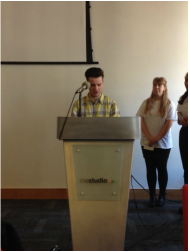 The last session of the day focussed on mental health and mental illness. We were lucky and fortunate to have Matt Windle, who was Birmingham's Young Poet Launderette of 2007/8. He presented a poem titled 'It can start when you are young" and you can view a reading of it here. His poem highlighted a many things, the things I would like to pick up on is that "Mental doesn't mean crazy just relates to the mind" and the fact that there is a "Suicide attempt every 4 minutes". This powerful poem left us a lot to mull over in our groups as the young people leading this session outlined the key questions of this discussion. Key Questions:
One of the main things that sticks in my mind from the discussion that arose is the point that was repeated by professionals at the event was the need for early intervention. Early intervention is something that we as young people have been advocating for a long time, we believe that the earlier the intervention the better outcomes for all involved, and in most cases can provide the patient with the best possible outcome. This point was best summed up by an analogy used by one of the professionals, that of a fire. "It is easy to put out a small fire than to put out a large fire. A Small fire is things like stress and anxiety, however if it is allowed to develop than it becomes uncontrollable" The second point was pushing for a holistic approach to a young person. We want to see a holistic approach in all aspects of our care, and in this approach mental health and wellbeing would be a key part of any discussion about health. There was a general consensus that the more interest a professional takes in us and the more caring they are about our life on the whole rather than just on the specific thing they are seeing us for, we are more able to open up and to discuss mental health issues. It is all about trust, you are more likely to share sensitive things, such as mental health issues, with those you trust. Typically this is mostly with our peers, however, if we were able to build a similar relationship with the healthcare professionals within our lives, they are more suited to be able to signpost us to the right places (I will be talking more about this later). The agencies which we would ask to be looking at taking a more holistic approach would include and not limited to GPs, school nurses, teachers, community worker and social workers. The third discussion point of the session was on the difference between mental illness and mental health. The 5 ways of wellbeing for mental health, which has been promoted by various organisation, such as the NHS and Mind (the mental health charity), was raised. This was the first time I had heard about this. While we, at the RCPCH YAP had discussed mental health and how to get better access to mental health services, I didn't realise there was 5 ways of maintaining your mental health. According to the NHS website the 5 ways to wellbeing for mental health is:
"Mental health is about building ones resilience to stress and to keep yourself mental healthy" as one of the guests alluded to. Through following the 5 ways to mental wellbeing you can ensure that you look after your mental health. "Mental illness occurs when your mental health is not being looked after". Therefore, it is important we prioritise our mental health and ensure more young people know about what mental wellbeing is and how to ensure they are looking after their mental health. Along with this comes the discrepancy in the definition of mental health, as it became apparent in our discussion, both prior and at the event, young people and adults (including healthcare professionals), have a very different conception of what mental health means. When the words mental health come into a conversation with young people, all the stigma that is associated with those terms comes rushing out and the need to talk about it disappears. There is a feeling that young people "Don’t know who to talk to", owing to this stigma and for fears of what their peers will think. Therefore, to this end one of the recommendations was engaging with young people more and educating them with the use of mental health literacy and again working with agencies mentioned above to ensure young people are signposted to the right place when they are in need of help. This is in the acknowledgement that "professionals can’t know everything but they can and must signpost!" Question and Answer Panel with Youth Chairs and Health Professionals 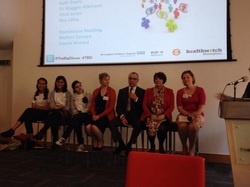 The people sitting on the Panel were Michelle McLoughlin, Kath Evans, Dr Maggie Atkinson (England's Children's Commissioner) and Roy Lilley (NHS Writer, Broadcaster, commentator and conference speaker) as well as the three youth chairs (Pictured right). This allowed a chance for the children and young people and the healthcare professionals of the audience to grill the panel of experts about the topics of the day as well as on topics which we felt had not been covered in the day. Here are some of my stand out points from the discussion as well as some key quotes from the panel. When asked about the future of the Big Discussion, the young chairs expressed their enthusiasm and passionate to not let the discussion die down. We started of 'The Big Discussion' and we are all united in saying that we will do what we can to keep this discussion going and keep holding the key members to account and pushing and striving for excellence in children and young people healthcare. We can only do this by "Keeping on challenging, that is how things change", as Dr Atkinson eloquently put it. Our determination and passion was only fuelled even more by the support that we have from key people within the NHS such as the Children's Commissioner, Kath as well as the Chief Medical Officer who prioritised child health in her report. When questioned why there were no commissioners from Clinical Commissioning Groups present at our discussion, the wonderful Kath Evans came back with "Events like today energise health care professionals and provide opportunities for staff to hear directly from young people about their experiences. There's lots of good stuff in the NHS but we need to be honest there's lots we can be doing better, having Children and Young people's leads in Clinical Commissioning Groups and connecting and working with young people is the only way we can improve the NHS. " While there was no clinical commissioners present, there were enough people with influence present to have impact and to encourage CCGs to recruit young people on their groups and hear and learn from our insights. Kath also advocated "Celebrating the bright spots (where there were excellent models of care) and spread them across the country. " A lovely and light-hearted but important question on which we ended the question and answer panel was "What did the panel have for breakfast?". This got a varied response from the panel but all humorous answers, including one panellist who mentioned that she only had a crumpet. Key note from the Children's Commissioner, Dr Maggie Atkinson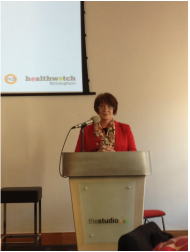 After the question and answer panel, Dr Maggie Atkinson took the stage. Dr Maggie Atkinson "was appointed Children's Commissioner for England in 2010. The Children's Commissioner promotes and protects children's rights in England by listening to what young people say making sure adults in charge take their views and interests into account." She has always been a great supporters of our rights in healthcare just like Kath and all other present at our event. She really drove home the point we as young people have been repeating for ages, the point of talking to children and young people and not just to parents. In her speech she also pointed at the speed at things were changing, comment that things aren't changing 'if we held this event 10 years ago the things being said would be the same'. She also backed up Kath's earlier point of ensuring that children and young people need a seat at the table at the level of CCGs. That is the level we need to be if we are truly to influence and make changes that improve our lives. CCGs are in charge of paying for and financing the changes within the health system. If we really want to influence change, we need to be allowed the opportunity to sit at alongside CCGs on their panels, to ensure our voices get heard. Dr Atkinson was fully behind this in regards to this. She also highlighted some key resources, which she said were fully copyright free and that we should all be using in order to maximise the collaboration between children and young people and health care professionals and our advocates. The website of the Children's Commissioner and the resources she alluded to can be found here: http://www.childrenscommissioner.gov.uk/ She rounded off her speech with a quote from Mark Twain which can be found below, this was a really passionate and persuasive way to round off her speech as well as the day: My Final ThoughtsWith the day ending on a high and positive note with Dr Atkinson and Aled, it left everyone present on a high. At the end of the day we asked all attending to write down a pledge of what they will do on the back of this event to make a change in their local communities or within their place of work. We were really excited to see the amount of pledge cards we got back. We will be sending the pledges back to the individuals in the future to remind them of the pledge they made and to see how they are getting on. 'The Big Discussion' got a massive spark and fire going behind it not only on the Twitterverse on @TheBigDiscuss as well as on the #TBD, there was a lot of enthusiasm which you could see in all who came. This is including the young people who helped organise this, we were so relieved the event went really well in our eyes. However, as the end of the day like I said in my last blog 'Words are useless without action', we had 'The Big Discussion' as a way of sparking action. We have started of this reaction and we hope to see action coming as a result of it.
We as young people will keep to our pledge of keeping this drive and the discussion going. We will ensure that the flame we lit at 'The Big Discussion' doesn't go out. We will keep fuelling it and we will keep pushing for more collaboration with healthcare professionals and our advocates. As the day highlighted, together our actions can be much stronger and our results doubled with our efforts halved. A gallery from the day can be found here
3 Comments
8/3/2015 09:00:40 pm
Need to organize these types of seminars for providing awareness to people about healthcare
Reply
18/6/2016 12:33:03 am
this is really good blog and seminar hold key for providing health facilities around the globe. you are doing good job.
Reply
3/8/2017 03:14:05 am
I just found this blog and have high hopes for it to continue. Keep up the great work, its hard to find good ones. I have added to my favorites. Thank You.
Reply
Leave a Reply. |
|||||||
